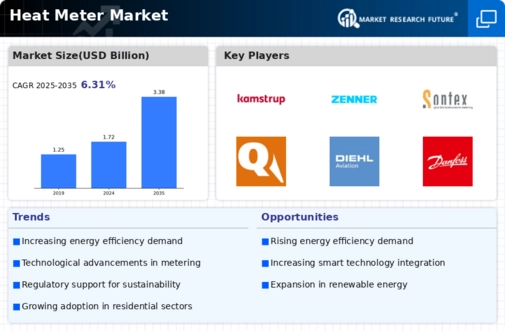Top Industry Leaders in the Heat Meter Market

*Disclaimer: List of key companies in no particular order
The global heat meter market is bubbling with intense competition as established industry giants and agile newcomers vie for their positions, employing diverse strategies to attract customers and gain market foothold. This comprehensive analysis delves into the landscape, encompassing key player tactics, market share evaluation factors, emerging trends, and the overall competitive backdrop.
Key Player Strategies:
Leading entities like Diehl (Germany), Danfoss (Denmark), Landis+Gyr (Switzerland), litron (US), Honeywell Elster (US), Kamstrup (Denmark), Zenner (US), Sontex (Switzerland), Qundis (Germany), Siemens AG (Germany), and others mark their presence in the market.
-
Market Leaders: Kamstrup, Landis+Gyr, and Apator lead with extensive product portfolios, robust distribution networks, and strong brand equity. Innovation, research in smart metering tech, and strategic acquisitions define their approach. -
Regional Players: Itron (US), Zenner (Germany), and Sontex (Switzerland) tailor offerings to regional regulations, foster close relations with local utilities, and provide cost-effective solutions. -
New Entrants: Startups and tech-driven companies offer advanced solutions like intelligent heat meters with integrated analytics, remote monitoring, and AI-driven energy management, leveraging agility, niche focus, and competitive pricing.
Market Share Analysis Factors:
-
Product Portfolio: Varieties, connectivity types, and applications catering to diverse needs. -
Geographical Reach: Penetration in key markets, adapting to local nuances. -
Technological Advances: Investment in smart tech, analytics, and building system integration. -
Pricing and Services: Competitive pricing with efficient service and maintenance. -
Sustainability: Eco-friendly solutions emphasizing energy efficiency and reduced carbon footprint.
New and Emerging Trends:
-
Smart Heat Meters: Rise of smart meters with integrated grids and cloud platforms for data analysis. -
Data-Driven Services: Energy audits, consumption optimization, personalized heating advice based on real-time data. -
IoT Integration: Heat meters meshed with building systems for centralized control and energy management. -
Sustainability Focus: Eco-materials, green manufacturing, and energy-efficient heat meters. -
Subscription Models: Transition from purchase to data-driven subscription models for accessibility and affordability.
Competitive Scenario:
-
Intense Competition: Established players and startups foster a dynamic and competitive environment. -
Tech Innovation: Continuous advancements in tech drive product differentiation and customer acquisition. -
Regional Variations: Tailored strategies and product diversification due to regulatory differences and preferences. -
Customer Value Focus: Value-added services beyond meter installation to cater to specific needs. -
Sustainability Drive: Development of eco-solutions and emphasis on energy-saving benefits.
Industry Developments and Latest Updates:
- Diehl launches an ultrasonic water meter with integrated leak detection technology to enhance water resource management.
- Danfoss partners with a smart building platform provider to streamline heat meter integration with building systems for optimized energy consumption.
- Landis+Gyr acquires a smart grid software company to expand its portfolio of heat meter communication and data management solutions.
- litron showcases its new heat meter featuring LoRaWAN® technology at a trade show for improved data transmission.
- Honeywell Elster reports increased demand for its heat metering solutions in North America, focusing on smart metering technologies for data-driven solutions.
The competitive heat meter market pulsates with technological advancements, evolving consumer needs, and a pressing sustainability focus. Understanding player strategies, market factors, and emerging trends is crucial for companies to chart their course in this dynamic landscape. By adapting to technology, offering data-driven services, and emphasizing sustainability, companies can secure their position in this vibrant and growing market.










